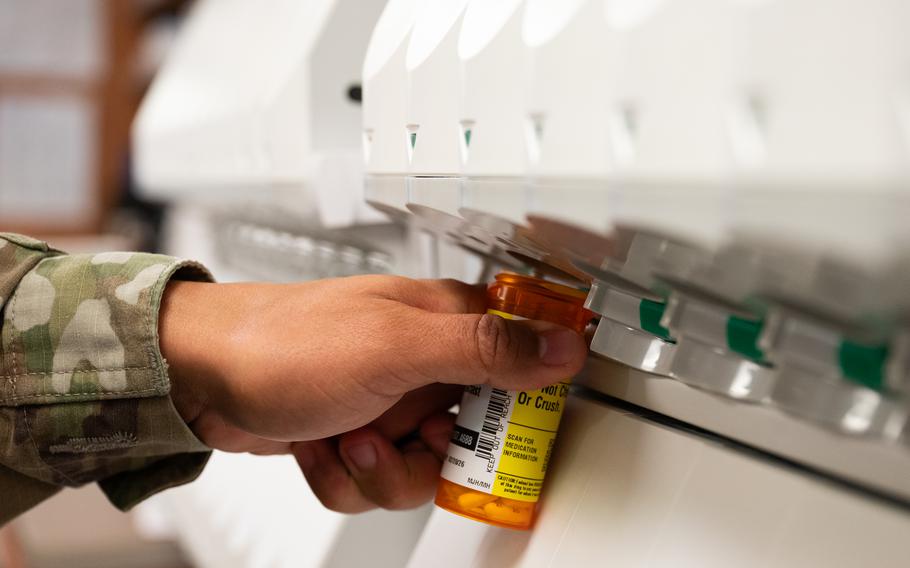
An uninterrupted and stable pharmaceutical supply chain is essential to ensure the readiness of our nation’s service members and the health of our veterans. (Kendra Ransum/U.S. Air Force)
An uninterrupted and stable pharmaceutical supply chain is essential to ensure the readiness of our nation’s service members and the health of our veterans. From routine medications to lifesaving treatments, access to essential drugs is not merely a matter of health care — but rather a cornerstone of national security.
The global pharmaceutical supply chain that is meant to enhance the system is inherently vulnerable to disruptions, including those caused by geopolitical tensions and global pandemics. In a time of crisis, such a disruption threatens the health of those most essential in protecting our country.
A key strategy for building a resilient supply chain is for the departments of Veterans Affairs and Defense to embrace the role of government-only pharmaceutical suppliers. These dedicated entities help minimize disruptions and provide a unique pathway to stability for this important system.
VA and DOD operate under unique and nonnegotiable mandates. For these agencies, a consistent supply of pharmaceuticals is not just desirable; it is mission-critical.
Active-duty personnel require a steady stream of medications to maintain peak physical and mental readiness, ensuring they can fulfill their duties without compromise. Many veterans live with chronic conditions tied to their service. For them, uninterrupted access to medication is essential to daily life and long-term health. As our veterans age, the number of medications per patient increases. Both departments are also tasked with preparing for large-scale emergencies, natural disasters, or conflicts that would require immediate and substantial pharmaceutical reserves.
The impact of supply chain failures on these populations would be profound and immediate. A disruption can translate directly into delayed patient care, compromised military operations, and a significant blow to American health security.
Unlike the commercial market, which prioritizes profitability and broader consumer demand, VA and DOD have highly specialized, long-term, and often-niche pharmaceutical needs. Commercial suppliers, driven by global market trends, may shift production, raise prices, or prioritize more lucrative markets that could potentially leave government health care systems scrambling for essential pharmaceuticals. This fundamental misalignment underscores the need for a more tailored approach.
This is precisely where government-only pharmaceutical suppliers come in. These firms — by definition focused solely on fulfilling government contracts — establish dedicated production lines and distribution channels exclusively for public sector needs.
This specialization creates a buffer against the volatility of the broader commercial market. Through long-term agreements, such as five-year fixed-price National Contracts, these firms often provide stable and predictable pricing to their federal health care partners.
These suppliers additionally are structured to meet consistent demand without diversion. While traditional commercial suppliers might reallocate drugs during supply chain shocks to maximize profits, government-only partners plan and execute strategies to ensure VA and DOD receive their needed amount of medications. They typically carry safety stock and sequester supply for the government that would otherwise be at risk of going to commercial pharmacies. This differentiation significantly reduces competition for supply, as government agencies are no longer battling the entire commercial sector for essential medicines during either routine moments or crises.
Another advantage is in quality control and security. Government contracts inherently demand stringent quality standards and robust security protocols, fostering a supply chain that is not only reliable but also highly secure against counterfeiting or tampering.
Consider a recent shock to the supply chain: the COVID-19 pandemic. The outbreak disrupted global manufacturing, shipping and distribution. Drugs essential to the health service members and veterans — such as hydroxychloroquine — became more limited in their supply.
Government-only pharmaceutical suppliers were uniquely able to respond to this disruption. As prices rose due to limited supply, they were able to fight for allocation from the drug manufacturer, being able to make these essential medicines available for VA and DOD.
These suppliers are more than just vendors; they are a strategic asset that provides a critical layer of resilience to supply chains that our national health relies on. Embracing these indispensable partnerships is not merely a logistical choice but a strategic imperative that safeguards our nation’s most precious resource: its people.
Benjamin Hall is the chief executive officer of Golden State Medical Supply Inc., the leading pharmaceutical supplier to the federal health care market. For 16 years, he’s specialized in meeting the unique supply needs of the departments of Veterans Affairs and Defense.